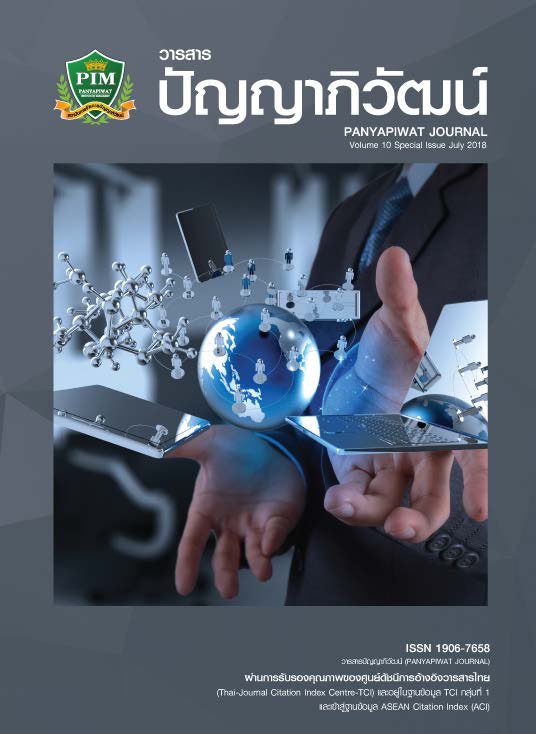THE EFFECTS OF PERSONAL TYPES AND DECISION-MAKING MODES ON IRRATIONAL FINANCIAL BEHAVIOR OF CHINESE STUDENTS UNDER THE CLASSIC SCENARIO EXPERIMENT
Main Article Content
บทคัดย่อ
Based on classic situational experiment developed by Thaler, Kahneman and Tversky, this paper studies the relationship between personality types, decision-making style and irrational financial behaviors. The results show that personality types, and decision-making modes have significant effect on individual irrational financial behaviors. Thus, Individuals of different personality types and decision-making modes show distinct difference in their irrational financial behaviors. Besides, personality types and decision-making modes have different predictive power for various irrational financial behaviors. The finding of the paper fill the gap that most researchers focus on single psychological factor’s effect on certain irrational financial behavior, proving that irrational financial behaviors are subject to the intertwined effect of multiple psychological factors.
Article Details
“ข้าพเจ้าและผู้เขียนร่วม (ถ้ามี) ขอรับรองว่า บทความที่เสนอมานี้ยังไม่เคยได้รับการตีพิมพ์และไม่ได้อยู่ระหว่างกระบวนการพิจารณาลงตีพิมพ์ในวารสารหรือแหล่งเผยแพร่อื่นใด ข้าพเจ้าและผู้เขียนร่วมยอมรับหลักเกณฑ์การพิจารณาต้นฉบับ ทั้งยินยอมให้กองบรรณาธิการมีสิทธิ์พิจารณาและตรวจแก้ต้นฉบับได้ตามที่เห็นสมควร พร้อมนี้ขอมอบลิขสิทธิ์บทความที่ได้รับการตีพิมพ์ให้แก่สถาบันการจัดการปัญญาภิวัฒน์หากมีการฟ้องร้องเรื่องการละเมิดลิขสิทธิ์เกี่ยวกับภาพ กราฟ ข้อความส่วนใดส่วนหนึ่งและ/หรือข้อคิดเห็นที่ปรากฏในบทความข้าพเจ้าและผู้เขียนร่วมยินยอมรับผิดชอบแต่เพียงฝ่ายเดียว”
References
Cai, H. J. & Zhu, Z. W. (2001). A preliminary revision of the psychological type scale (MBTI). Chinese Journal of Applied Psychology, 7, 33-37. [in Chinese]
Duxbury, D., Keasey, K. & Zhang, H. (2005). Mental accounting and decision making: Evidence under reverse conditions where money is spent for time saved. Journal of Economic psychology, 26(4), 567-580.
Filbeck, G., Hatfield, P. & Horvath, P. (2005). Risk Aversion and personality type. The Journal of Behavioral Finance, 6(4), 170-180.
Kahneman, D. & Tversky, A. (1979). Prospect theory: an analysis of decision under risk. Econometrica, 47(2), 263-292.
Lu, J. Q. (2009). Modern investment psychology. Beijing: Capital University of Economics and Business press. [in Chinese]
Miao, D. M. & Huang, P. E. (2000). Validity analysis of MBTI personality type questionnaire. Journal of Chinese Psychology Acta Psychologica Sinica, 32, 324-331. [in Chinese]
Scott, S. & Bruce, R. (1995). Decision-making style: the development and assessment of a~measure.Educational and Psychological Measurement, 55(5), 818-831.
Shefrin, H. & Statman, M. (1984). The disposition to sell winners too early and ride losers too long: theory and evidence. Journal of Finance, 40, 777-790.
Shi, J. Y. (2010). The theory and application of behavioral finance. Dalian: Dalian University of Technology Press. [in Chinese]
Thaler, R. (1985). Mental accounting and consumer choice. Market Science, 4(3), 199-214.
Tversky, A. & Kahnernan, D. (1981). The framing of Decisions and the psychology of Choice.Science, 211, 453-458.
Wang, L. & Zheng, X. P. (2003). Investment behavior and personality characteristics of Chinese Securities Investors. Journal of Chinese Psychology Acta Psychologica Sinica, 26, 24-27.[in Chinese]
Yang, H. F. & Zhao, S. M. (2004). Research on personality types of enterprise managers. Journal of Chinese Psychology Acta Psychologica Sinica, 27, 983-985. [in Chinese]
Yang, J. Q. (2015). Irrational decision-making research and prospects: from the schema theory to the prospect theory. Journal of Dongbei University of Finance and Economics, 98(2), 3-11.[in Chinese]
Zhang, H. H. & Ling, W. L. (2005). Rational, emotional and individual economic decisions. Foreign Economies and Management, 27, 2-9. [in Chinese]
Zhang, S. M. (2001). Research on human resource management. Beijing: China Renmin University Press. [in Chinese]

